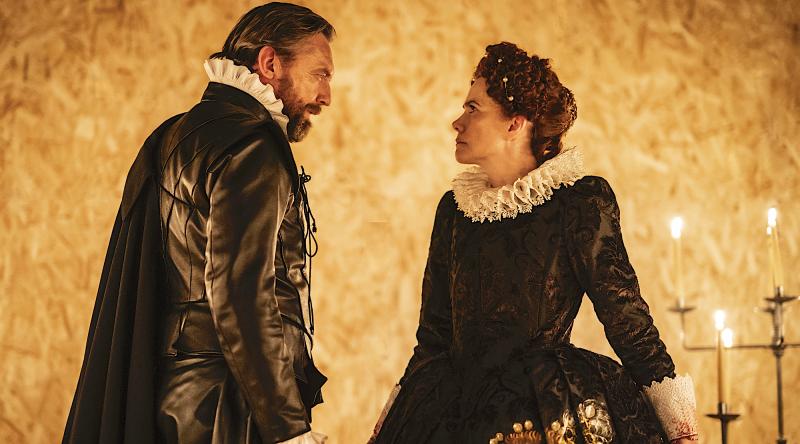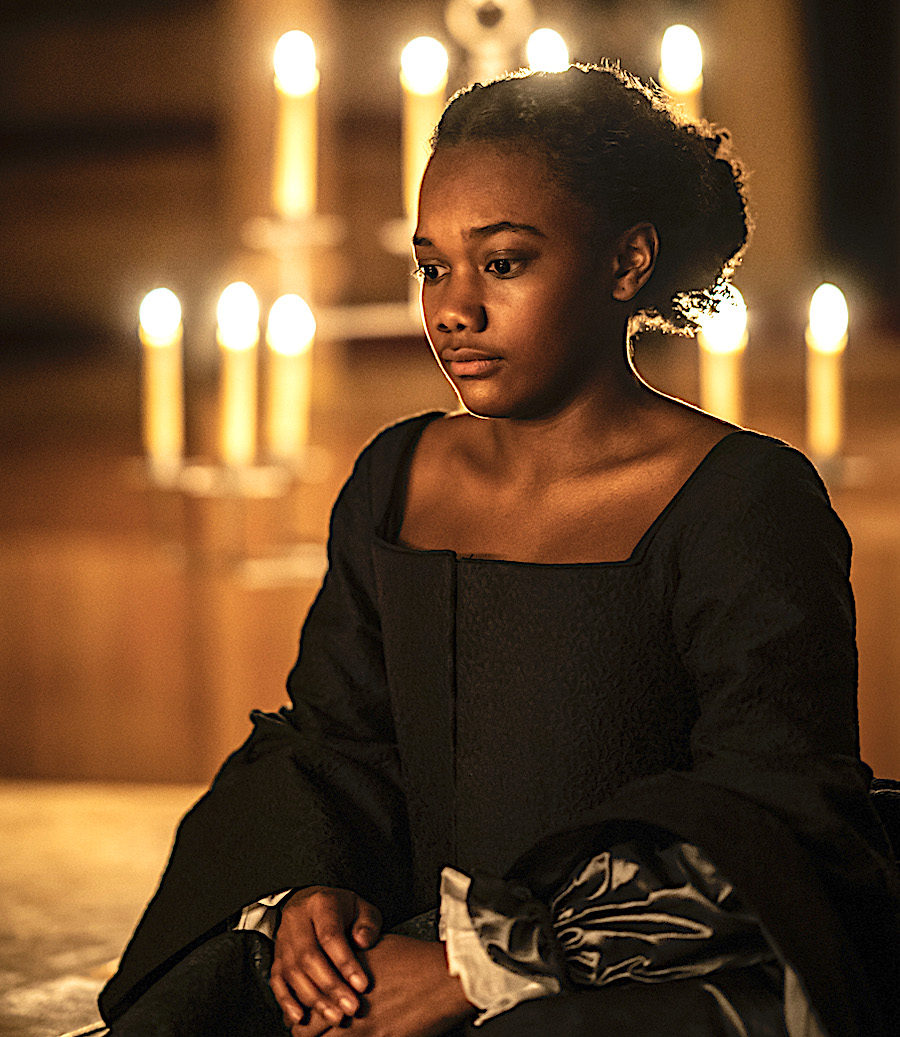Swive, Shakespeare's Globe review – pacy, dagger-sharp rewriting of history | reviews, news & interviews
Swive, Shakespeare's Globe review – pacy, dagger-sharp rewriting of history
Swive, Shakespeare's Globe review – pacy, dagger-sharp rewriting of history
An interrogation of power, womanhood and the mythologies with which we surround ourselves

History has corseted Elizabeth I with the title of “Virgin Queen” for centuries, but in Ella Hickson’s laceratingly witty new play she is revealed as nothing less than a lioness on a hot tin roof.
“My mother seduced a man so successfully that he altered the constitutional history of this country.” Abigail Cruttenden’s crisp enunciation cuts the air as the play opens. One of Anne Boleyn’s ploys of course, was not letting Henry VIII sleep with her until he agreed to annul his marriage to Catherine of Aragon. “When she finally took her knickers off,” declares Elizabeth acerbically, “she lost everything, including her head.”
The pared down, self-consciously modern script is intrinsic to the wit of a production that interrogates concepts of power, womanhood, and, the mythologies with which we surround ourselves. Gesturing to the exquisite wood-carved surroundings of the Sam Wanamaker theatre, Elizabeth continues, “The cosy, candley, Elizabethan thing – it’s bullshit…It’s only five years old… It creates a false sense of security.”
Security, of course, was something that Elizabeth entirely lacked during her formative years. That’s reinforced from the moment we see Nina Cassells’s empathetic and intriguing Princess Elizabeth panicking and praying frantically because of her fear of the dark. At the start of the play, her father Henry VIII is dying, but this is after he’s beheaded her mother and worked his way through four more wives. Beyond this she must fight off accusations of conspiracy from both her brother and her sister when they take the throne, each accusation coming with the threat of execution (pictured below, Nina Cassells).
 Four actors play the different roles in Natalie Abrahami’s production. At the start the superb Cruttenden is a world-weary Catherine Parr, exasperated by taking orders from a much younger king and increasingly alarmed at the effect Elizabeth is having on her husband Thomas Seymour. Questions about what happened with Elizabeth and a man 25 years her elder have been raised by various historians. Here Elizabeth is shown to take charge of the situation by testifying against him when he is accused of trying to replace the king, so he is executed for treason.
Four actors play the different roles in Natalie Abrahami’s production. At the start the superb Cruttenden is a world-weary Catherine Parr, exasperated by taking orders from a much younger king and increasingly alarmed at the effect Elizabeth is having on her husband Thomas Seymour. Questions about what happened with Elizabeth and a man 25 years her elder have been raised by various historians. Here Elizabeth is shown to take charge of the situation by testifying against him when he is accused of trying to replace the king, so he is executed for treason.
Cruttenden takes on the role of Elizabeth after she becomes queen. By this point, as well as witnessing the fate of her mother, she has seen Catherine Parr betrayed by her husband and killed by childbirth, and her sister Mary betrayed by her husband Philip II of Spain and killed by the illusion of pregnancy. With an increasingly cold-eyed clarity, she is aware that both the constitution and nature are against her: one condemns her to be submissive to any man who she marries, no matter how he behaves, the other threatens to kill her in childbirth. In this stylishly streamlined rendition of events, it feels utterly clear that only a madwoman would submit to the narrative that society demands of her.
Ben Stones’s highly effective design deliberately violates the cosy beauty of the Sam Wanamaker theatre by covering it with chipboard. As the play progresses, we see how this mirrors the way in which Elizabeth strips away decorative narratives which attempt to imply that women are worshipped when they are really being exploited. She may be the most powerful woman of her age, but death and humiliation lurk in every corner if she lets her guard down. "Swive" is the Elizabethan term for intercourse, yet it’s the narratives of romance and motherhood that are really designed to trap her.
Angus MacRae’s music subtly underscores the tension through compositions written for cello, clarinet and percussion. As, at first, her unwanted love-interest, Thomas Seymour, and then the love of her life, Robert Dudley, Colin Tierney proves skilled at evoking the mercurial emotions needed to navigate the poisoned sophistication of the court. As William Cecil, Michael Gould is convincingly slippery and cold-blooded.
Yet ultimately this production belongs to Cruttenden, who cuts through the tangled web of what it was to be Elizabeth with simultaneously anarchic and knowingly anachronistic flair. Hickson’s play is a thrillingly irreverent reframing of a well-trodden past, brilliantly innovative even as it demonstrates the terrifying strength of its roots in historical fact.
- Swive at the Sam Wanamaker Theatre till Feb 15
- More theatre reviews on theartsdesk
The future of Arts Journalism
You can stop theartsdesk.com closing!
We urgently need financing to survive. Our fundraising drive has thus far raised £49,000 but we need to reach £100,000 or we will be forced to close. Please contribute here: https://gofund.me/c3f6033d
And if you can forward this information to anyone who might assist, we’d be grateful.

Subscribe to theartsdesk.com
Thank you for continuing to read our work on theartsdesk.com. For unlimited access to every article in its entirety, including our archive of more than 15,000 pieces, we're asking for £5 per month or £40 per year. We feel it's a very good deal, and hope you do too.
To take a subscription now simply click here.
And if you're looking for that extra gift for a friend or family member, why not treat them to a theartsdesk.com gift subscription?
more Theatre
 Othello, Theatre Royal, Haymarket review - a surprising mix of stateliness and ironic humour
David Harewood and Toby Jones at odds
Othello, Theatre Royal, Haymarket review - a surprising mix of stateliness and ironic humour
David Harewood and Toby Jones at odds
 Macbeth, RSC, Stratford review - Glaswegian gangs and ghoulies prove gripping
Sam Heughan's Macbeth cannot quite find a home in a mobster pub
Macbeth, RSC, Stratford review - Glaswegian gangs and ghoulies prove gripping
Sam Heughan's Macbeth cannot quite find a home in a mobster pub
 The Line of Beauty, Almeida Theatre review - the 80s revisited in theatrically ravishing form
Alan Hollinghurst novel is cunningly filleted, very finely acted
The Line of Beauty, Almeida Theatre review - the 80s revisited in theatrically ravishing form
Alan Hollinghurst novel is cunningly filleted, very finely acted
 Wendy & Peter Pan, Barbican Theatre review - mixed bag of panto and comic play, turned up to 11
The RSC adaptation is aimed at children, though all will thrill to its spectacle
Wendy & Peter Pan, Barbican Theatre review - mixed bag of panto and comic play, turned up to 11
The RSC adaptation is aimed at children, though all will thrill to its spectacle
 Hedda, Orange Tree Theatre review - a monument reimagined, perhaps even improved
Scandinavian masterpiece transplanted into a London reeling from the ravages of war
Hedda, Orange Tree Theatre review - a monument reimagined, perhaps even improved
Scandinavian masterpiece transplanted into a London reeling from the ravages of war
 The Assembled Parties, Hampstead review - a rarity, a well-made play delivered straight
Witty but poignant tribute to the strength of family ties as all around disintegrates
The Assembled Parties, Hampstead review - a rarity, a well-made play delivered straight
Witty but poignant tribute to the strength of family ties as all around disintegrates
 Mary Page Marlowe, Old Vic review - a starry portrait of a splintered life
Tracy Letts's Off Broadway play makes a shimmeringly powerful London debut
Mary Page Marlowe, Old Vic review - a starry portrait of a splintered life
Tracy Letts's Off Broadway play makes a shimmeringly powerful London debut
 Little Brother, Soho Theatre review - light, bright but emotionally true
This Verity Bargate Award-winning dramedy is entertaining as well as thought provoking
Little Brother, Soho Theatre review - light, bright but emotionally true
This Verity Bargate Award-winning dramedy is entertaining as well as thought provoking
 The Unbelievers, Royal Court Theatre - grimly compelling, powerfully performed
Nick Payne's new play is amongst his best
The Unbelievers, Royal Court Theatre - grimly compelling, powerfully performed
Nick Payne's new play is amongst his best
 The Maids, Donmar Warehouse review - vibrant cast lost in a spectacular-looking fever dream
Kip Williams revises Genet, with little gained in the update except eye-popping visuals
The Maids, Donmar Warehouse review - vibrant cast lost in a spectacular-looking fever dream
Kip Williams revises Genet, with little gained in the update except eye-popping visuals
 Ragdoll, Jermyn Street Theatre review - compelling and emotionally truthful
Katherine Moar returns with a Patty Hearst-inspired follow up to her debut hit 'Farm Hall'
Ragdoll, Jermyn Street Theatre review - compelling and emotionally truthful
Katherine Moar returns with a Patty Hearst-inspired follow up to her debut hit 'Farm Hall'
 Troilus and Cressida, Globe Theatre review - a 'problem play' with added problems
Raucous and carnivalesque, but also ugly and incomprehensible
Troilus and Cressida, Globe Theatre review - a 'problem play' with added problems
Raucous and carnivalesque, but also ugly and incomprehensible

Add comment